Can you cut 1 Tonne of carbon pollution out of your life?
Take the challengeThis is a guest article from the 1 Million Women community, written by Katie Liew
There are approximately 1,585 plastic bottles of water consumed per second worldwide, and less than 10% of those are actually recycled, with 90% ending up in our oceans and landfill. When these bottles do eventually break down (in roughly 100 years), it releases a concoction of toxic chemicals, including Bisphenol A (BPA), which is used to make plastic hard and clear and is an endocrine disrupter known to be hazardous to human health. Not to mention the plastic-making process requires more water to "produce" the water itself - 1.4 litres for a 1-litre output!
In addition to this, with the high percentage of plastic waste (especially plasic bags) winding up in our oceans, around 700 marine species fall prey to extinction from entanglement, pollution and ingestion.
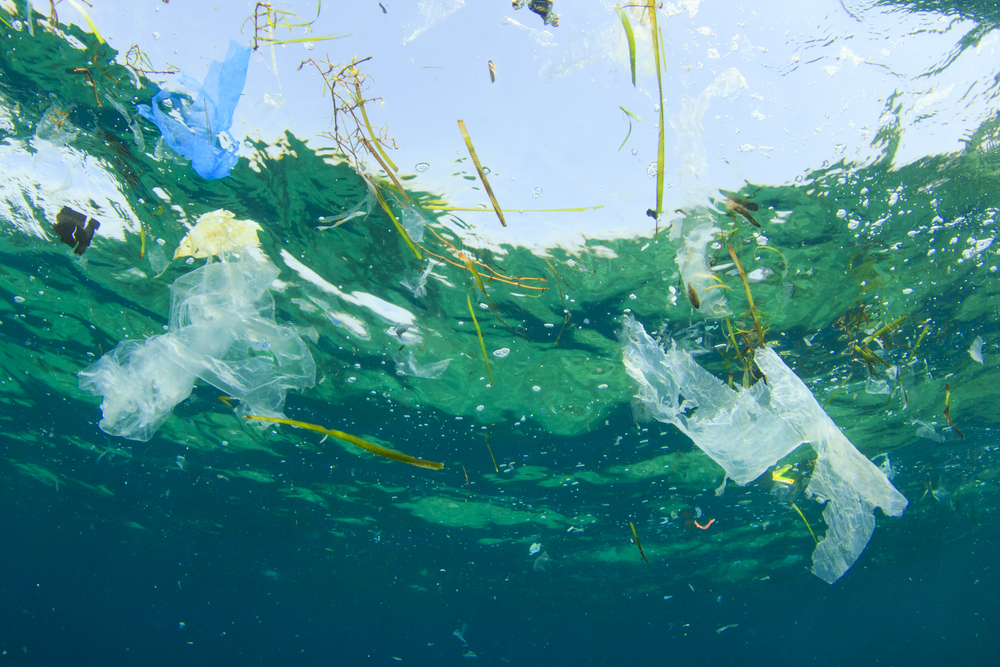
(Image: Shutterstock)
"Biodegradable" plastics
Word on the street is that biodegradable plastics are the way of the future. People can now purchase items with a clear conscience, and deposit these 'eco-friendly' materials straight in the recycling bin with the knowledge that they're actually reducing their carbon footprint. Right?
Unfortunately, this sort of mentality may actually be more detrimental to the environment. Plastic doesn't "break down" in the same way that a banana peel can turn into compost. Plastic only breaks down into smaller pieces through photodegradation (exposure to sunlight), "biodegradable" or not. In fact, a new study found biodegradable plastic takes just as long to break down as regular plastic. Awkward.
Looks like these new "green" solutions may actually encourage consumers to buy more plastic, as well as making them take less care to dispose of these products properly if they're labelled "biodegradable".
READ THIS NEXT: Our complete guide to getting plastic out of your life
So what are some REAL solutions to our love affair with single-use plastics?
Check out some of these amazing designs!
Bottles made from plants
Ari Jónsson, an Icelandic product designer, recognised "there was an urgent need to find ways to replace some of the unreal amount of plastic we make, use and throw away every day" and questioned the "use of materials that take hundreds of years to break down in nature to drink from once and then throw away."
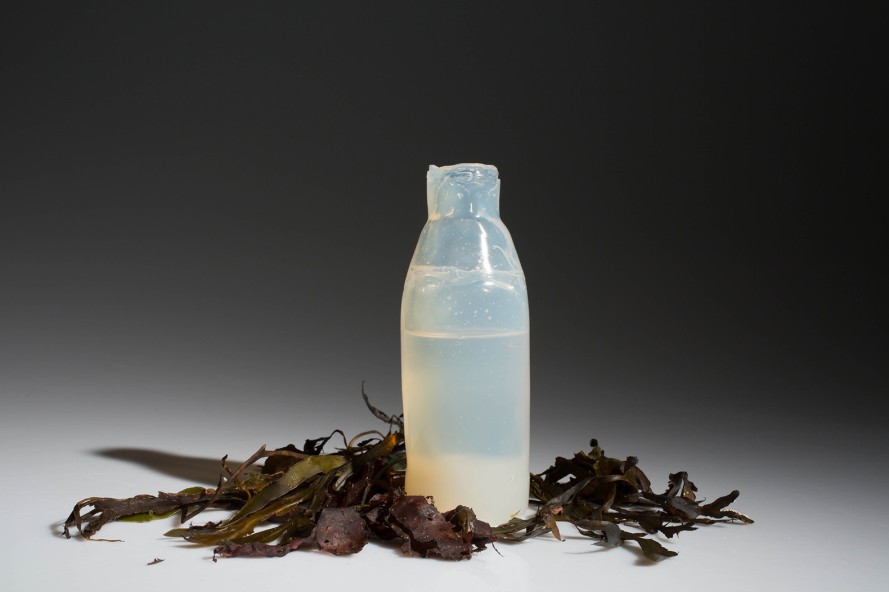
(Images courtesy of Ari Jónsson)
His solution is a truly biodegradable water bottle made of algae, or more specifically, agar (this stuff forms the supporting structure in the cell wall of a certain species of algae). Agar is often used as a plant-based substitute for gelatine in desserts, and is both safe for the environment and humans.
The algae bottle will retain its unique shape as long as it's full of water; once it runs empty, it will commence the 100% biodegradable process. You can even eat the bottle afterwards (if you like the flavour!).
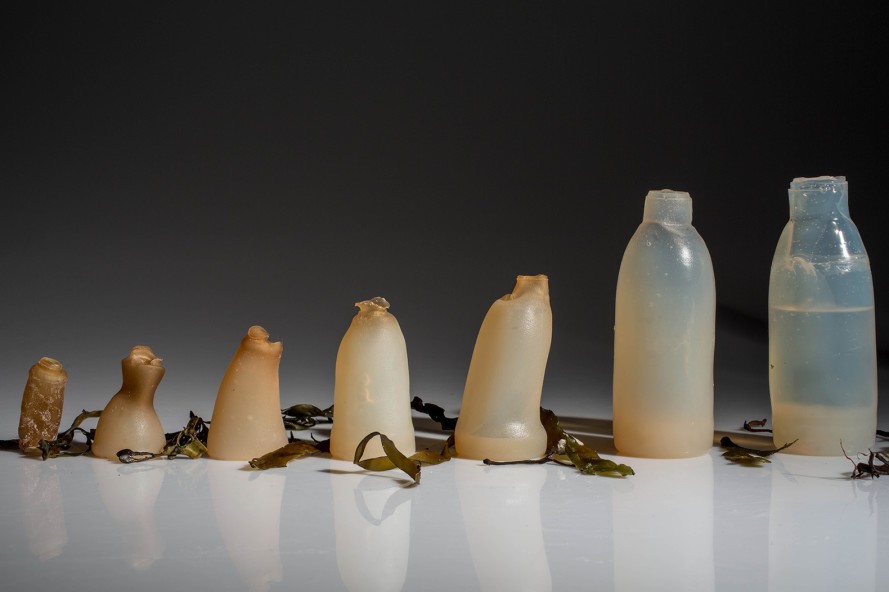
Another algae-derived water drinking device is the Ooho!. Inspired by egg yolks, the algae membrane is produced by shaping liquids into spheres by placing frozen water into a calcium chloride and brown algae solution. The introduction of frozen water causes the outer layer of water in the calcium solution to form a thin, flexible skin.
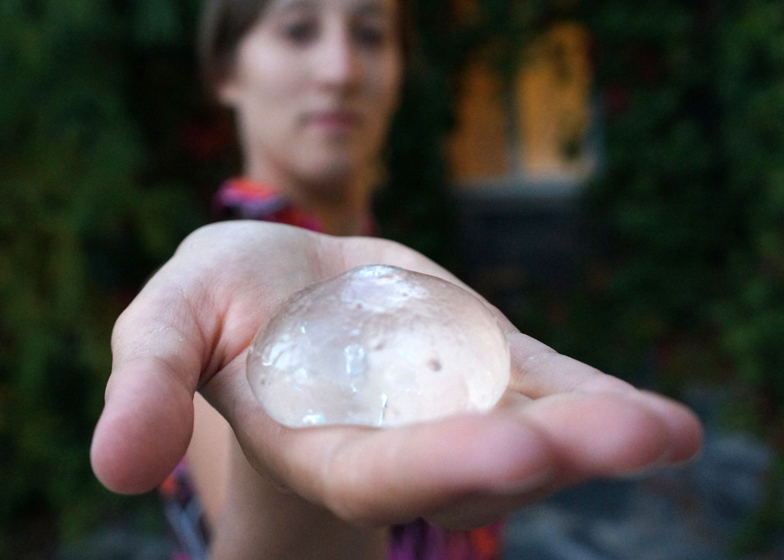
(Image: dezeen)
To drink from the Ooho!, light pressure is applied to the sphere causing the water inside to burst through; it's like drinking a massive raindrop!
Want to make these yourself? Head on over here to give it a go!
Edible cutlery
It will come as no surprise that recyclable items may never find their way into a recycling plant, with only 9% actually being reused. The simplest way to limit the amount of plastic ending up in our ocean is to reduce our personal plastic consumption – by way of actual consumption, much like our edible water bottles!
Approximately forty billion plastic utensils are used within the United States each year. Multiply this sixteen times to obtain a worldwide figure; not even a calculator can fathom these sorts of numbers! Fortunately, Narayana Peesapaty from Hyderabad in India could, however, and in 2011, he designed Bakeys, an edible alternative to plastic disposable cutlery.
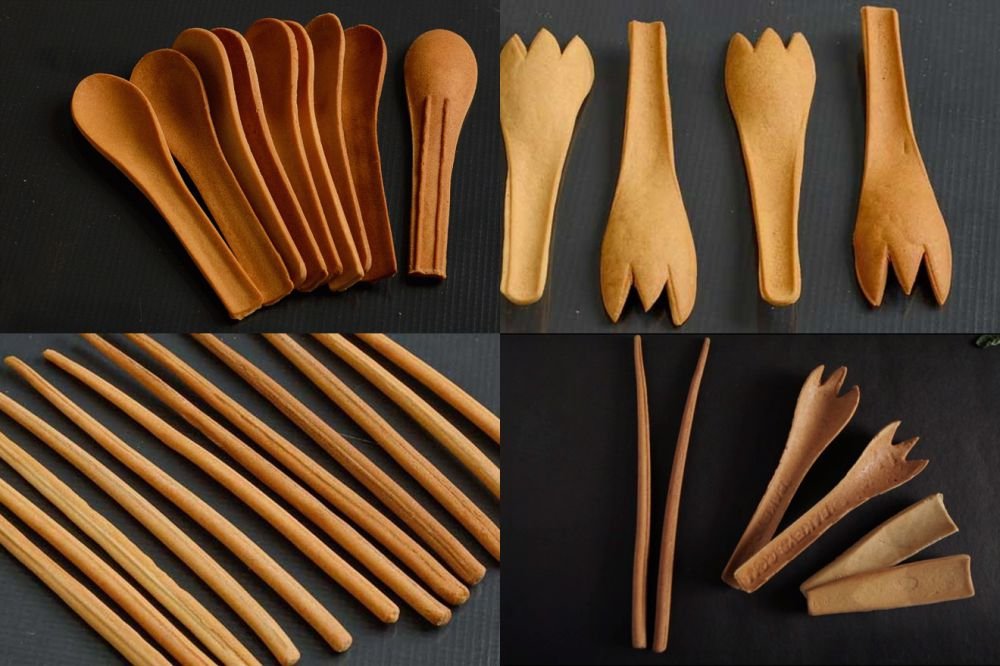
(Image: Bakeys)
100% vegan, organic, dairy-free, nut-free, preservative-free, transfat-free, fair trade friendly, biodegradable and edible (phew!), Bakeys' spoons are made of three flours: rice, millet and sorghum. The lack of water, moisture or fat in the products allows for a long shelf life of about two years without the need for extra preservatives.
Unlike plastics, if the spoons are not consumed, they are able to degrade within ten days in any outside environment.
Support Bakeys on Kickstarter to achieve their mission of starting a cutlery revolution, and to help change the way society eat and think about waste. And if you fancy yourself a little challenge, why not give your hand at making your own edible cutlery!
All-natural plates and bowls
Alas, the eco-friendly kitchenware goodies don't stop there. A research team at the Naresuan University in Bangkok developed a process to produce watertight, degradable food bowls made of leaves from the thong kwao, sak and sai trees.
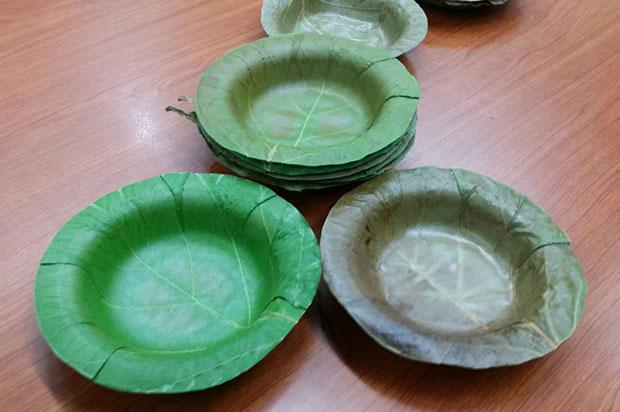
(Image: Chinnawat Singha)
After the concerns over the rise of polluting Styrofoam containers the team experimented with different leaves to produce a hot water and leak-proof bowl, which will naturally degrade naturally after being discarded.
Farewell, Plastic!
Despite the sad-tistics, it's not all doom and gloom. Germany offer a bottle–cash exchange to promote recycling, while Bundanoon in NSW Australia voted in 2009 to ban bottled water, with drinking fountains and filtered water dispensers a common feature of the town.
The magnitude of our planet's plastic problem is one so vast and somewhat incomprehensible, but there are always ways you can help.
But above all, reduce. Together, we can all make a difference!READ THIS NEXT: How to avoid single-use plastics
